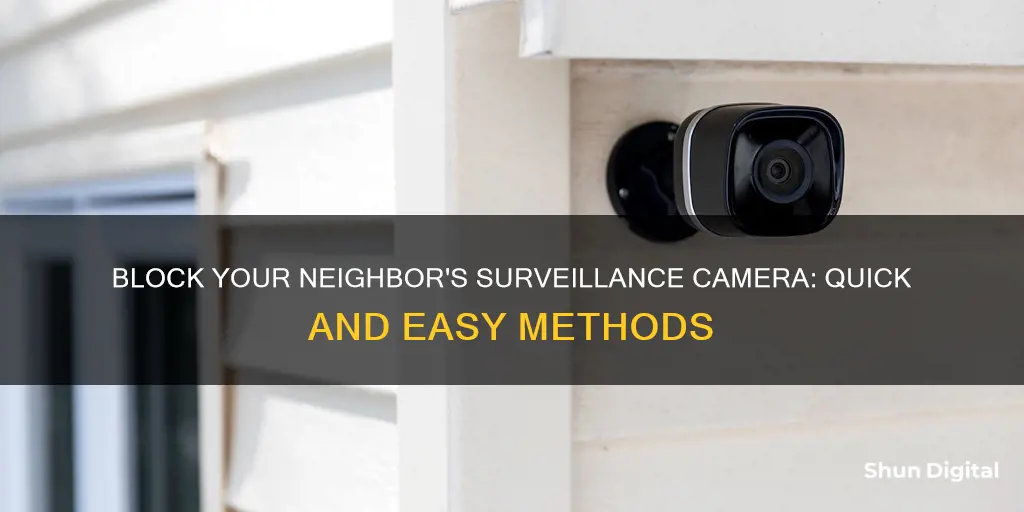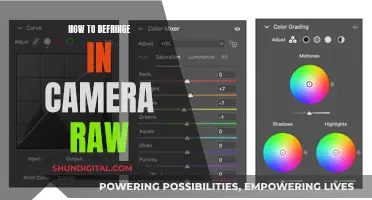
If you're concerned about your neighbour's security camera invading your privacy, there are several steps you can take to address the issue. Firstly, it's important to determine whether the camera is real, as some people use fake cameras as a deterrent. If it is real, open communication is the best way to resolve the problem. Talk to your neighbour about your concerns and request that they adjust the camera angle to respect your privacy. If this doesn't work, you can seek help from mediators in your local community or neighbourhood mediation centres. Another option is to block the camera's view by planting trees or shrubs, installing privacy fences or screens, or using curtains or blinds. You can also install your own security camera to protect your property and potentially deter your neighbour's camera. However, it's important to remember that directly damaging or tampering with your neighbour's camera can lead to legal problems.
| Characteristics | Values |
|---|---|
| Communicate with your neighbour | Politely ask them to adjust the angle or change the direction of the camera |
| Check if the camera is real | Observe if there is a flashing red light at night or directly ask your neighbour |
| Check if the camera is within legal boundaries | Research the laws and regulations in your area regarding security cameras and privacy |
| Seek help from a third party or mediators | Contact your local community service or neighbourhood mediation centres |
| Block the camera's view | Use tall trees, fences, curtains, blinds, privacy screens, hedges, trellises with climbing plants, or reflective materials |
| Install your own security camera | Install a security camera on your property to make your neighbour rethink their surveillance tactics |
| Contact the police or a lawyer | If your neighbour is deliberately recording your property, seek legal help |
What You'll Learn

Talk to your neighbour
If you're feeling uncomfortable with your neighbour's security camera, it's perfectly normal. There's nothing wrong with blocking your neighbour's security camera to make sure that it's monitoring their property without invading your privacy.
The first thing you should do is communicate. Talk to your neighbour about the issue of their cameras pointing at your property. Be sure to communicate how you feel about the security camera and politely ask them to adjust the angle or change the direction of the cameras. There's always a chance they're unaware or it's just a coincidence.
Before you talk to your neighbour, it's a good idea to research the laws and regulations in your area regarding security cameras and privacy. In many places, there are specific rules about where cameras can be pointed and what can be recorded. Understanding these laws can help guide your conversation and any further actions you may need to take. Remember, it's not the security camera that's spying on you, it's the owner who installed it.
If your neighbour is pointing their cameras directly at your bedroom, bathroom, or other private spaces, this may violate laws. If your talk with your neighbour doesn't work, you can collect evidence and talk to the police. You can also seek help from mediators, such as your local community justice or neighbourhood mediation centre. They can help mediate a meeting between you and your neighbour to settle the problem.
If you want to block the camera's view without communicating, you can try planting tall trees or shrubs, installing privacy fences or screens, or using strategic obstructions like reflective materials that bounce sunlight towards the camera. However, keep in mind that physically blocking or tampering with your neighbour's security camera can lead to legal trouble, so communication is always the best first step.
Fixing Galaxy S6 Edge Plus Camera Focus Issues
You may want to see also

Install privacy fences or screens
If you're concerned about a neighbour's security camera invading your privacy, there are a few options you can consider to block the camera's view. One option is to install a privacy fence or screen along the property line. This can physically block the camera's view of your house. However, it's important to ensure that any fence or screen complies with local regulations and does not infringe on your neighbour's property rights.
When installing a privacy fence or screen, you can choose from a variety of materials such as wood, vinyl, or metal. It's important to measure the distance between your property and your neighbour's camera to determine the required height and length of the fence or screen. You may also need to obtain permits or approvals from your local council or homeowners' association before installing any structures.
Another option is to use a movable privacy screen, which can be placed in front of the camera's line of sight when needed. This provides flexibility, as you can adjust the screen's position to maintain your privacy while still allowing for social interactions with neighbours if desired.
Additionally, you can enhance the privacy provided by fences or screens by incorporating climbing plants or decorative elements. Climbing plants, such as ivy or vines, can create a natural barrier that fills in any gaps in the fence or screen, further obstructing the camera's view. Decorative elements, such as trellises or arbour structures, can also be added to increase the height and visual appeal of the privacy barrier.
Remember to be mindful of your neighbour's concerns as well. Communicate openly with them about your privacy concerns, and be willing to collaborate on solutions that respect both your privacy and their security needs.
Capturing Close-Up Objects: Focus Tips for Photographers
You may want to see also

Use natural barriers
If you're uncomfortable with your neighbour's security camera, it's perfectly normal to want to block it, especially if it's invading your privacy. While the most obvious solution is to blind the camera, this could get you into legal trouble. Damaging the camera in any way is also a criminal offence.
A natural way to block a neighbour's security camera is to use natural barriers. Here are some ways to do this:
- Plant tall trees or dense shrubs: Strategically plant tall trees or dense shrubs along the boundary between your properties to block the camera's view. Choose plants that provide year-round coverage and grow to an appropriate height.
- Install fences or screens: A privacy fence or screen installed along the property line can physically block the camera's view. Ensure that any fence or screen complies with local regulations and does not infringe on your neighbour's property rights.
- Consider other natural barriers: If planting trees or installing fences is not feasible, consider other natural barriers such as tall hedges or trellises with climbing plants. These can create visual barriers without blocking airflow or sunlight.
- Use trees and barriers: Plant trees or put up barriers that are high enough to block the camera's view.
- Use ready-grown trees and shrubs: Strategically place ready-grown trees and shrubs in front of windows, entrances, or in the direct line of sight of the security camera to block its view.
While using natural barriers is a cost-effective and environmentally friendly way to block a neighbour's security camera, it is important to note that this method may not completely block the camera's view, especially if it is positioned high up. Additionally, natural barriers may take time to grow to an effective height, and the placement of these barriers must comply with local regulations and property rights.
Smart Guide: Universal Charger for Fuji NP-W126
You may want to see also

Install your own security camera
If you're uncomfortable with your neighbour's security camera, the best first step is to communicate your concerns to them. They may not be aware of the camera's angle and may be willing to adjust it to respect your privacy. It's also a good idea to research the laws and regulations in your area regarding security cameras and privacy, as this can help guide your conversation and any further actions.
However, if your neighbour is unreasonable, you do have the option to install your own security camera on your property. Here are some things to consider if you decide to go down this route:
Type of Camera
You can choose to install a Pan-Tilt-Zoom (PTZ) security camera, which offers several advantages. PTZ cameras can be remotely controlled to pan, tilt, and zoom, allowing you to monitor a large area. This type of camera can also act as a deterrent to your neighbour, as they may doubt their actions and question the necessity of their own camera.
Camera Placement
Consider the placement of your camera carefully. You'll want to ensure it covers the areas you wish to monitor, such as your yard, windows, or any other private spaces that may be in the line of sight of your neighbour's camera. Mount the camera high enough, perhaps in an attic vent, so that it captures your neighbour's activities.
Legality
Before installing a security camera, it's crucial to understand the laws and regulations in your area regarding the use of such devices. Consult with a legal professional if necessary. Generally, you are allowed to install a security camera on your property, but you must also respect the privacy of others. Ensure that your camera is not invading your neighbour's privacy or recording areas with a reasonable expectation of privacy, such as their bedroom or bathroom.
Camera Features
When choosing a security camera, look for features such as motion detection, which can alert you to any activity within the camera's field of view. You may also want to consider a camera with infrared (IR) night vision, which can provide clear footage even in low-light conditions.
Alternative Options
If you're unsure about installing a security camera, there are other ways to block your neighbour's camera. For example, you can plant tall trees or shrubs along the boundary between your properties to physically block the camera's view. Another option is to use privacy screens, curtains, or blinds on your windows to obscure the camera's view.
Remember, it's always best to try to resolve these issues amicably and through open communication. Installing your own security camera can be an effective way to protect your privacy, but be sure to do so within the boundaries of the law and respect your neighbour's rights as well.
Camera Tickets: Valid in Florida?
You may want to see also

Seek legal help
If you are concerned about a neighbour's security camera invading your privacy, it is important to know your rights and the laws in your area. While it is generally not illegal for your neighbour to have security cameras installed on their property, even if they are aimed at your property, there are exceptions.
Your neighbour does not have the right to record you or anyone else without consent in areas where there is a reasonable expectation of privacy. If their camera is pointed directly at your bedroom, bathroom, or another private space, and they are recording, this may violate the law.
If you believe your neighbour is recording you in private spaces, you should gather evidence and contact the police for help. Such behaviour is unacceptable and should be reported. You can also consult a lawyer who specialises in property rights and privacy issues to guide you on your rights and potential courses of action.
Before taking legal action, it is always best to try and resolve the issue amicably. Start by talking to your neighbour and expressing your concerns. They may not realise the angle of their camera and may be willing to adjust it to respect your privacy. If this does not work, you can seek help from mediators, such as your local community service or neighbourhood mediation centres. These mediators are experienced in dealing with neighbourhood disputes and can help facilitate a conversation between you and your neighbour to resolve the issue.
If all else fails and you believe your neighbour is still invading your privacy, then you can consider taking legal action with the help of a lawyer.
Home Surveillance Cameras: Are They Worth the Cost?
You may want to see also
Frequently asked questions
Damaging or tampering with the camera in any way is illegal and will only create a legal headache for you. Blinding the camera, for example, by using spray paint, is generally illegal and can result in criminal charges or civil lawsuits.
It is important to first determine if your neighbour's security camera is real. Due to budget constraints, many people buy realistic-looking but completely fake security cameras online to deter theft.
The most straightforward and effective method is to have an open conversation with your neighbour. They may be oblivious to the fact that their camera is aimed at your property. Politely ask them to adjust the angle or change the direction of the camera.
You can block the camera's view by planting trees and shrubs, installing privacy fences or screens, or closing the curtains.







